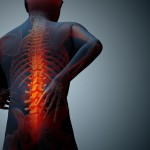 One of the largest studies conducted on lumbar spine disc degeneration found that overweight and obese people are at significantly increased risk for the painful back condition. The study evaluated approximately 2600 Southern Chinese volunteers through radiographic and clinical assessment, including measuring weight and height. Nine percent of the study participants were obese, 36 percent were overweight, 48 percent were in the normal weight range, and 7 percent were underweight.
One of the largest studies conducted on lumbar spine disc degeneration found that overweight and obese people are at significantly increased risk for the painful back condition. The study evaluated approximately 2600 Southern Chinese volunteers through radiographic and clinical assessment, including measuring weight and height. Nine percent of the study participants were obese, 36 percent were overweight, 48 percent were in the normal weight range, and 7 percent were underweight.
The researchers found that as Body Mass Index (BMI) increased, there was a significant increase in the extent and severity of disc degeneration. The most severe spinal disc degeneration was observed in obese patients. In total, disc degeneration was noted in 1,890 (72.7%) of the participants. End-stage disc degeneration with disc space narrowing was observed with elevated BMI, particularly with overweight and obese individuals. The condition was also more common in men, affecting 76 percent of the participants, in comparison to women at 71 percent. It was also more prevalent among older people.
Low back pain is a leading debilitating condition throughout the world and has severe socioeconomic and health-care consequences. Conditions like lumbar spine disc degeneration can cause functional impairment, diminished quality of life, loss of working ability, potential psychological distress, and increased health-care costs. Research has previously shown that there’s an association between higher BMI and reports of low back pain but this study was the first to find a significant association between the presence, increased extent, and global severity of disc degeneration in overweight and obese adults. Future studies should take into consideration the role of excess weight on disc degeneration. The study authors explained that “As people put on weight, disc degeneration may start to occur because of physical loading on the disc. Additionally, fat cells may play a role by creating chronic low-grade inflammation. Since obesity is a growing problem worldwide, the study’s findings have considerable public health implications. If these issues continue to plague society, they can further affect spine health leading to low back pain and its consequences.”
Patients with chronic back pain may have tried the numerous treatments available, however, none have been proven to be highly effective, and few have been evaluated for cost-effectiveness. Earlier research did find that physical activity involving stretching, regardless of whether it is achieved using yoga or more conventional exercises, has moderate benefits in individuals with moderately impairing low back pain. You can read about the study’s findings here.






Weight Loss Studies & Clinical